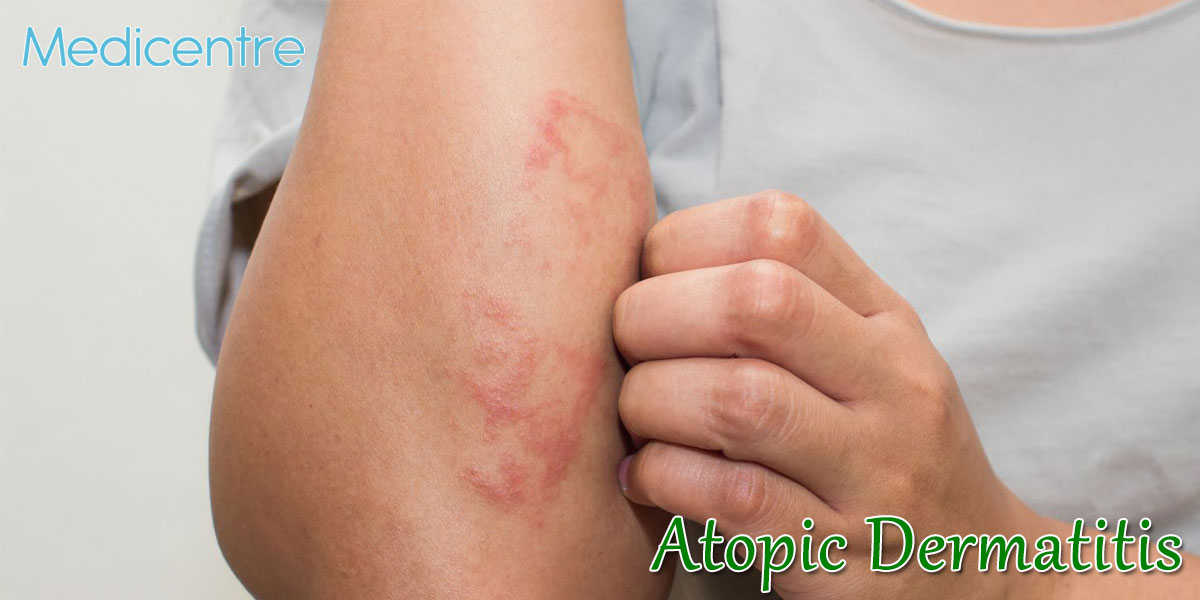Atopic Dermatitis
Atopic Dermatitis or popularly called as eczema is the medical condition where you have itchy and red skin. The condition is common amongst the children, but it may occur in people of any age. Eczema is the chronic condition which automatically flares up and then subsides and may accompany other conditions like hay fever and asthma. There are no treatments available in medical science for Atopic Dermatitis, but self care measures can alleviate the itching and other symptoms and prevent new outbreaks. Avoiding the use of harsh soaps and irritants, applying moisturizer on skin and medicated ointments and creams can help you prevent new outbreaks and minimize the symptoms.

Symptoms of Atopic Dermatitis
The symptoms of Atopic Dermatitis usually vary from person to person and it may include:
- Itching sensation and may increase at night
- Thickened, dry, cracked and scaly skin
- Raised bumps that leak fluids and crust over when scratched
- Reddish and brownish patches on hands, wrists, ankles, feet, eyelids, upper chest, inside the bends of elbows, knees and on face
- Raw, sensitive and swollen skin due to scratching
What are the Causes of Atopic Dermatitis?
The prime cause of Atopic Dermatitis is still not known in medical science. However, it observed that healthy skin that helps retain moisture can protect the skin from bacteria and infection. Atopic Dermatitis is basically related to a mixture of factors:
- Immune system dysfunction
- Irritable skin, dry skin, which minimizes the ability of skin to act as potential barrier
- Gene variation affecting the barrier functioning of skin
- Environmental conditions
- Bacteria like Staphylococcus aureus on skin that is formed a film blocking the sweating glands
Risk Factors & Complications
The prime factors that increase the risk of developing Atopic Dermatitis include:
- Being the healthcare worker which is associated with hand dermatitis
- Family or personal history of Atopic Dermatitis, hay fever, asthma, or allergies
Risk factors for children include:
- Attending childcare
- Being African American
- Residing in urban areas
- Parents with high level of education
- Having Attention Deficit Hyperactivity Disorder
The Complications of Atopic Dermatitis include:
- Asthma and Hayfever - Atopic Dermatitis sometimes precedes these conditions.
- Chronic Itchy and Scaly Skin – This is the itchy condition which is medically referred as neurodermatitis and it starts with patch of itchy skin. Scratching the area makes it itchier.
- Skin Infections – Scratching the breaks regularly can cause open sores or cracks and this increases the risk of causing infections from the viruses and bacteria.
- Eye Problems – Some of the eye problems may also arise which includes itching of eyelids, inflammation of eyelids and eye watering.
- Sleep Disorders – Due to itch scratch cycle you may have complications for sleeping and this reduces the quality of sleep.
Diagnosis of Atopic Dermatitis
There is no need of any lab test for identifying the Atopic Dermatitis. Doctors usually make the diagnosis simply by examining the skin and by reviewing the old medical history. Doctors may also perform patch testing or perform other tests to rule out the skin disease and to recognize the condition that accompany the Atopic Dermatitis.
Treatment for Atopic Dermatitis
Atopic Dermatitis is the condition which may persist and hence you are required to try different treatments over the months or years. Even if you respond to any treatment, it is likely that the symptoms may flare up again. So, it is necessary that you determine the condition earlier to get start with the right treatment.
Medications like ointment for controlling inflammation and itching are prescribed which also helps in reducing the inflammation and repair the skin. Drugs to combat against the infection are also prescribed. This helps in treating the infection and preventing it from spreading to other parts.
Therapies like wet dressing, light therapies are also prescribed in order to treat the condition. Treatment for stress management and other approaches are also prescribed for treating Atopic Dermatitis. Behaviour modification, relaxation and biofeedback are some of the approaches which can improvise the habitual scratching. The treatment for infantile eczema include recognizing and avoiding the skin irritations, avoiding the highest temperatures and lubricating the skin with bath oils and creams.